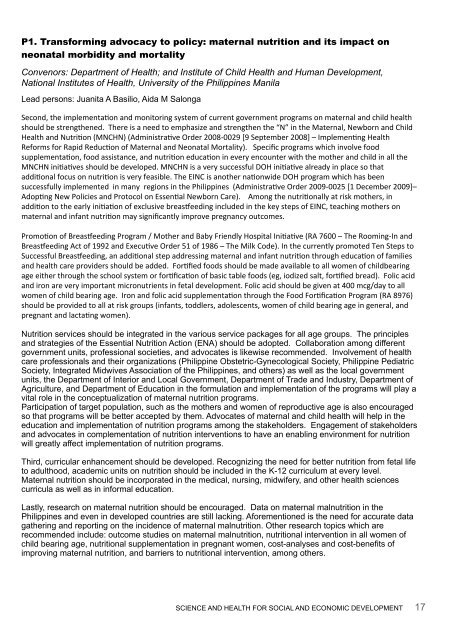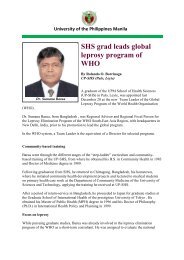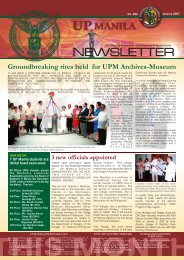NIH 2013 Program - University of the Philippines Manila
NIH 2013 Program - University of the Philippines Manila
NIH 2013 Program - University of the Philippines Manila
Create successful ePaper yourself
Turn your PDF publications into a flip-book with our unique Google optimized e-Paper software.
P1. Transforming advocacy to policy: maternal nutrition and its impact on<br />
neonatal morbidity and mortality<br />
Convenors: Department <strong>of</strong> Health; and Institute <strong>of</strong> Child Health and Human Development,<br />
National Institutes <strong>of</strong> Health, <strong>University</strong> <strong>of</strong> <strong>the</strong> <strong>Philippines</strong> <strong>Manila</strong><br />
Lead persons: Juanita A Basilio, Aida M Salonga<br />
Second, <strong>the</strong> implementa$on and monitoring system <strong>of</strong> current government programs on maternal and child health<br />
should be streng<strong>the</strong>ned. There is a need to emphasize and streng<strong>the</strong>n <strong>the</strong> “N” in <strong>the</strong> Maternal, Newborn and Child<br />
Health and Nutri$on (MNCHN) (Administra$ve Order 2008-‐0029 [9 September 2008] – Implemen$ng Health<br />
Reforms for Rapid Reduc$on <strong>of</strong> Maternal and Neonatal Mortality). Specific programs which involve food<br />
supplementa$on, food assistance, and nutri$on educa$on in every encounter with <strong>the</strong> mo<strong>the</strong>r and child in all <strong>the</strong><br />
MNCHN ini$a$ves should be developed. MNCHN is a very successful DOH ini$a$ve already in place so that<br />
addi$onal focus on nutri$on is very feasible. The EINC is ano<strong>the</strong>r na$onwide DOH program which has been<br />
successfully implemented in many regions in <strong>the</strong> <strong>Philippines</strong> (Administra$ve Order 2009-‐0025 [1 December 2009]–<br />
Adop$ng New Policies and Protocol on Essen$al Newborn Care). Among <strong>the</strong> nutri$onally at risk mo<strong>the</strong>rs, in<br />
addi$on to <strong>the</strong> early ini$a$on <strong>of</strong> exclusive breas`eeding included in <strong>the</strong> key steps <strong>of</strong> EINC, teaching mo<strong>the</strong>rs on<br />
maternal and infant nutri$on may significantly improve pregnancy outcomes.<br />
Promo$on <strong>of</strong> Breas`eeding <strong>Program</strong> / Mo<strong>the</strong>r and Baby Friendly Hospital Ini$a$ve (RA 7600 – The Rooming-‐In and<br />
Breas`eeding Act <strong>of</strong> 1992 and Execu$ve Order 51 <strong>of</strong> 1986 – The Milk Code). In <strong>the</strong> currently promoted Ten Steps to<br />
Successful Breas`eeding, an addi$onal step addressing maternal and infant nutri$on through educa$on <strong>of</strong> families<br />
and health care providers should be added. For$fied foods should be made available to all women <strong>of</strong> childbearing<br />
age ei<strong>the</strong>r through <strong>the</strong> school system or for$fica$on <strong>of</strong> basic table foods (eg, iodized salt, for$fied bread). Folic acid<br />
and iron are very important micronutrients in fetal development. Folic acid should be given at 400 mcg/day to all<br />
women <strong>of</strong> child bearing age. Iron and folic acid supplementa$on through <strong>the</strong> Food For$fica$on <strong>Program</strong> (RA 8976)<br />
should be provided to all at risk groups (infants, toddlers, adolescents, women <strong>of</strong> child bearing age in general, and<br />
pregnant and lacta$ng women).<br />
Nutrition services should be integrated in <strong>the</strong> various service packages for all age groups. The principles<br />
and strategies <strong>of</strong> <strong>the</strong> Essential Nutrition Action (ENA) should be adopted. Collaboration among different<br />
government units, pr<strong>of</strong>essional societies, and advocates is likewise recommended. Involvement <strong>of</strong> health<br />
care pr<strong>of</strong>essionals and <strong>the</strong>ir organizations (Philippine Obstetric-Gynecological Society, Philippine Pediatric<br />
Society, Integrated Midwives Association <strong>of</strong> <strong>the</strong> <strong>Philippines</strong>, and o<strong>the</strong>rs) as well as <strong>the</strong> local government<br />
units, <strong>the</strong> Department <strong>of</strong> Interior and Local Government, Department <strong>of</strong> Trade and Industry, Department <strong>of</strong><br />
Agriculture, and Department <strong>of</strong> Education in <strong>the</strong> formulation and implementation <strong>of</strong> <strong>the</strong> programs will play a<br />
vital role in <strong>the</strong> conceptualization <strong>of</strong> maternal nutrition programs.<br />
Participation <strong>of</strong> target population, such as <strong>the</strong> mo<strong>the</strong>rs and women <strong>of</strong> reproductive age is also encouraged<br />
so that programs will be better accepted by <strong>the</strong>m. Advocates <strong>of</strong> maternal and child health will help in <strong>the</strong><br />
education and implementation <strong>of</strong> nutrition programs among <strong>the</strong> stakeholders. Engagement <strong>of</strong> stakeholders<br />
and advocates in complementation <strong>of</strong> nutrition interventions to have an enabling environment for nutrition<br />
will greatly affect implementation <strong>of</strong> nutrition programs.<br />
Third, curricular enhancement should be developed. Recognizing <strong>the</strong> need for better nutrition from fetal life<br />
to adulthood, academic units on nutrition should be included in <strong>the</strong> K-12 curriculum at every level.<br />
Maternal nutrition should be incorporated in <strong>the</strong> medical, nursing, midwifery, and o<strong>the</strong>r health sciences<br />
curricula as well as in informal education.<br />
Lastly, research on maternal nutrition should be encouraged. Data on maternal malnutrition in <strong>the</strong><br />
<strong>Philippines</strong> and even in developed countries are still lacking. Aforementioned is <strong>the</strong> need for accurate data<br />
ga<strong>the</strong>ring and reporting on <strong>the</strong> incidence <strong>of</strong> maternal malnutrition. O<strong>the</strong>r research topics which are<br />
recommended include: outcome studies on maternal malnutrition, nutritional intervention in all women <strong>of</strong><br />
child bearing age, nutritional supplementation in pregnant women, cost-analyses and cost-benefits <strong>of</strong><br />
improving maternal nutrition, and barriers to nutritional intervention, among o<strong>the</strong>rs.<br />
SCIENCE AND HEALTH FOR SOCIAL AND ECONOMIC DEVELOPMENT 17




